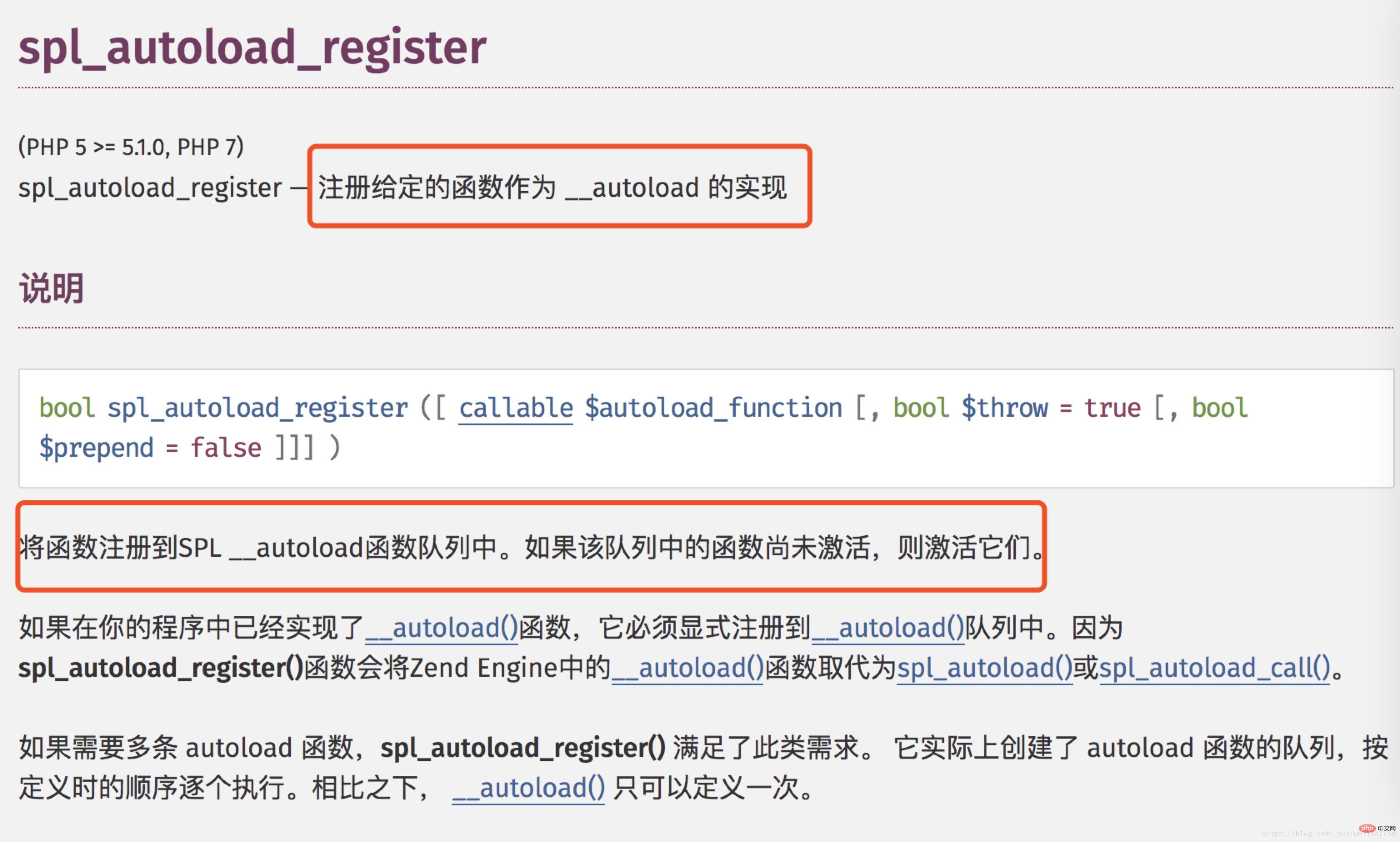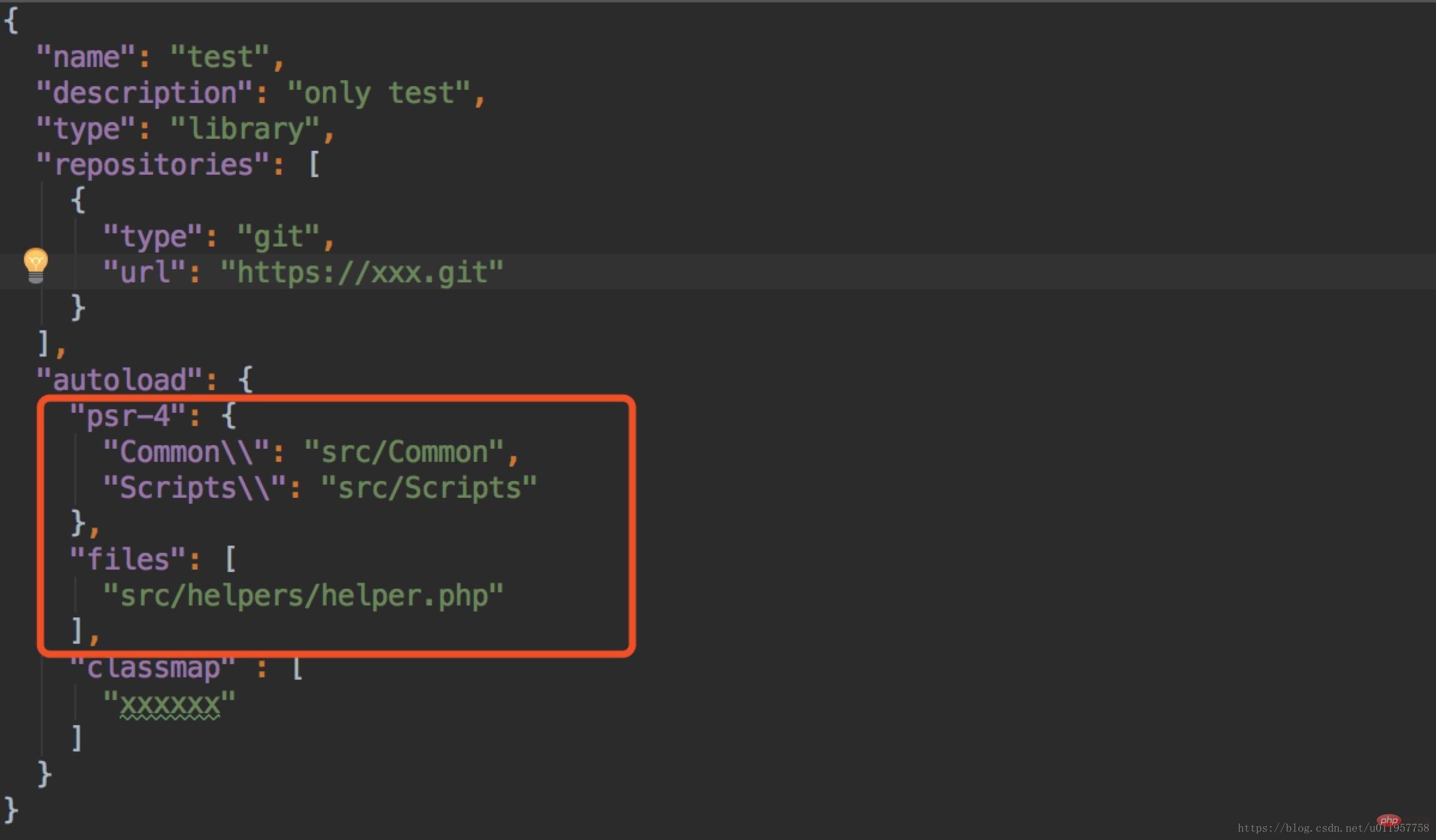下面由composer教程栏目给大家由浅入深的介绍composer自动加载机制,希望对需要的朋友有所帮助!

前言
由于对于composer自动加载机制的记忆只剩下了"spl_auto???"和"根据命名空间来推导出文件路径"这两个了。。。还是残缺的。。
本想网上收藏一篇详解,奈何,没发现符合我觉得的"由浅入深"文章。
所以有了这篇笔记。
以下知识点即将赶来:
1.了解一下spl_autoload_register
2.composer update发生的故事
3.追踪一下composer的自动加载
正文
1.了解一下spl_autoload_register
首先查一下php官方手册:
(偷懒可以只看红色部分即可)
是不是看着一知半解?
来用白话文来翻译一下:
我们new一个类的话,必须先require或者include类的文件,如果没有加载进来则会报错。这产生一个问题:那这样的话文件的头部到处都是requies和include,明显不符合程序员必须"偷懒"尿性。
为了不需要require或者include类文件也能正常的new一个类,出现了自动加载机制。spl_autoload_register这个函数就专门干这个事的。
从截图得知,此函数有三个参数:
| 参数 | 详解 |
|---|---|
| autoload_function | 这里填的是一个***"函数"的名称***,字符串或者数组,这个函数的功能就是把需要new的文件require或者include尽量,避免new的时候报错。简单的说就是要你封装一个***自动加载文件的函数*** |
| throw | 当自动加载的函数无法注册的时候,是否抛异常 |
| prepend | 是否添加函数到函数队列之首,如果是true则为首,否则尾部 |
来一波代码,印象深刻一些:
//文件 testClass.php ,即将new的类
class TestClass{
public function __construct() {
echo '你已经成功new了我了';
}
}
//文件autoloadDemo.php文件
spl_autoload_register('autoLoad_function', true, true);
function autoLoad_function($class_name){
echo "所有的require或者include文件工作都交给我吧!\r\n";
$class_filename = "./{$class_name}.php";
echo "我来加载{$class_filename}文件\r\n";
require_once("./{$class_name}.php");
}
$obj_demo = new TestClass();
输出:
所有的require或者include文件工作都交给我吧! 我来加载testClass.php文件 你已经成功new了我了
明白了这个加载的原理,看下文就顺利多了。
2.composer update发生的故事
将自动加载之前,必须要先说一下composer update,这里头承载了自动加载的前提。
composer项目都包含一个composer.json的配置文件。
这里头有一个关键的字段"autoload",包含psr-4和files两个字段。
psr-4:说明是基于psr-4规范的类库,都支持自动加载,只要在后面的对象中以**“命名空间:路径”**的方式写入自己的类库信息即可。
files:这就就更直接了,写入路径就自动加载。
按照以上配置每回composer update之后呢,都会更新一个很重要的文件:./vender/composer/autoload_psr4.php。
这个文件只做了一件事情:把命名空间和文件路径对应起来,这样后续自动加载就有映射根据了。
3.追踪一下composer的自动加载
composer的故事从唯一的一个require说起:
require '../vendor/autoload.php'
这个脚本执行了一个函数:
ComposerAutoloaderInitd9b31141b114fcbee3cf55d0e97b7f87::getLoader()
继续跟getloader函数做了什么?
public static function getLoader() {
if (null !== self::$loader) {
return self::$loader;
}
spl_autoload_register(array('ComposerAutoloaderInitd9b31141b114fcbee3cf55d0e97b7f87', 'loadClassLoader'), true, true);
self::$loader = $loader = new \Composer\Autoload\ClassLoader();
spl_autoload_unregister(array('ComposerAutoloaderInitd9b31141b114fcbee3cf55d0e97b7f87', 'loadClassLoader'));
$useStaticLoader = PHP_VERSION_ID >= 50600 && !defined('HHVM_VERSION') && (!function_exists('zend_loader_file_encoded') || !zend_loader_file_encoded());
if ($useStaticLoader) {
require_once __DIR__ . '/autoload_static.php';
call_user_func(\Composer\Autoload\ComposerStaticInitd9b31141b114fcbee3cf55d0e97b7f87::getInitializer($loader));
} else {
$map = require __DIR__ . '/autoload_namespaces.php';
foreach ($map as $namespace => $path) {
$loader->set($namespace, $path);
}
$map = require __DIR__ . '/autoload_psr4.php';
foreach ($map as $namespace => $path) {
$loader->setPsr4($namespace, $path);
}
$classMap = require __DIR__ . '/autoload_classmap.php';
if ($classMap) {
$loader->addClassMap($classMap);
}
}
$loader->register(true);
if ($useStaticLoader) {
$includeFiles = Composer\Autoload\ComposerStaticInitd9b31141b114fcbee3cf55d0e97b7f87::$files;
} else {
$includeFiles = require __DIR__ . '/autoload_files.php';
}
foreach ($includeFiles as $fileIdentifier => $file) {
composerRequired9b31141b114fcbee3cf55d0e97b7f87($fileIdentifier, $file);
}
return $loader;
}
这个函数主要做了两件事情:
1.将各种存有命名空间和文件映射关系的文件autoload_xxx.php加载了进来,并作了一些处理(比如:setPsr4将相关映射加载了进去,这个留意下,下文会有呼应。)。
2.注册了函数register
继续跟踪register做了什么:
public function register($prepend = false) {
spl_autoload_register(array($this, 'loadClass'), true, $prepend);
}
原来调用了spl_autoload_register函数,当类没加载的时候使用loadClass来加载类。(这个前文讲的很清楚了,应该很熟了)
继续跟踪loadClass实现:
public function loadClass($class) {
if ($file = $this->findFile($class)) {
includeFile($file);
return true;
}
}
大概可以看出,是做了文件的include。
继续跟踪下是怎么查找文件的,看findFile函数:
public function findFile($class) {
// class map lookup
if (isset($this->classMap[$class])) {
return $this->classMap[$class];
}
if ($this->classMapAuthoritative || isset($this->missingClasses[$class])) {
return false;
}
if (null !== $this->apcuPrefix) {
$file = apcu_fetch($this->apcuPrefix.$class, $hit);
if ($hit) {
return $file;
}
}
$file = $this->findFileWithExtension($class, '.php');
// Search for Hack files if we are running on HHVM
if (false === $file && defined('HHVM_VERSION')) {
$file = $this->findFileWithExtension($class, '.hh');
}
if (null !== $this->apcuPrefix) {
apcu_add($this->apcuPrefix.$class, $file);
}
if (false === $file) {
// Remember that this class does not exist.
$this->missingClasses[$class] = true;
}
return $file;
}
这个函数做了一件事:就是寻找类从上文的autoload_xxx.php初始化的数据中来寻找映射的文件路径。
其中这个函数findFileWithExtension,适用于寻找psr-4规范的文件的映射信息的。
继续跟踪findFileWithExtension:
private function findFileWithExtension($class, $ext) {
// PSR-4 lookup
$logicalPathPsr4 = strtr($class, '\\', DIRECTORY_SEPARATOR) . $ext;
$first = $class[0];
if (isset($this->prefixLengthsPsr4[$first])) {
$subPath = $class;
while (false !== $lastPos = strrpos($subPath, '\\')) {
$subPath = substr($subPath, 0, $lastPos);
$search = $subPath.'\\';
if (isset($this->prefixDirsPsr4[$search])) {
$pathEnd = DIRECTORY_SEPARATOR . substr($logicalPathPsr4, $lastPos + 1);
foreach ($this->prefixDirsPsr4[$search] as $dir) {
if (file_exists($file = $dir . $pathEnd)) {
return $file;
}
}
}
}
}
// PSR-4 fallback dirs
foreach ($this->fallbackDirsPsr4 as $dir) {
if (file_exists($file = $dir . DIRECTORY_SEPARATOR . $logicalPathPsr4)) {
return $file;
}
}
// PSR-0 lookup
if (false !== $pos = strrpos($class, '\\')) {
// namespaced class name
$logicalPathPsr0 = substr($logicalPathPsr4, 0, $pos + 1)
. strtr(substr($logicalPathPsr4, $pos + 1), '_', DIRECTORY_SEPARATOR);
} else {
// PEAR-like class name
$logicalPathPsr0 = strtr($class, '_', DIRECTORY_SEPARATOR) . $ext;
}
if (isset($this->prefixesPsr0[$first])) {
foreach ($this->prefixesPsr0[$first] as $prefix => $dirs) {
if (0 === strpos($class, $prefix)) {
foreach ($dirs as $dir) {
if (file_exists($file = $dir . DIRECTORY_SEPARATOR . $logicalPathPsr0)) {
return $file;
}
}
}
}
}
// PSR-0 fallback dirs
foreach ($this->fallbackDirsPsr0 as $dir) {
if (file_exists($file = $dir . DIRECTORY_SEPARATOR . $logicalPathPsr0)) {
return $file;
}
}
// PSR-0 include paths.
if ($this->useIncludePath && $file = stream_resolve_include_path($logicalPathPsr0)) {
return $file;
}
return false;
}
这个函数做了件事:将命名空间\类这样的类名,转换成目录名/类名.php这样的路径,再从前文setPsr4设置的映射信息中寻找映射信息,然后完成返回路径。
至此composer的自动加载机制结束。
Atas ialah kandungan terperinci 详解composer自动加载机制. Untuk maklumat lanjut, sila ikut artikel berkaitan lain di laman web China PHP!
 Komposer: Panduan Komprehensif untuk Pengurusan Pakej PHPMay 11, 2025 am 12:17 AM
Komposer: Panduan Komprehensif untuk Pengurusan Pakej PHPMay 11, 2025 am 12:17 AMKomposer adalah alat pengurusan pergantungan PHP yang menguruskan kebergantungan projek melalui fail komposer.json. 1. Gunakan komposerinit untuk memulakan projek. 2. Tambah kebergantungan seperti ComposerRequireguzzleHttp/Guzzle. 3. Penggunaan lanjutan termasuk mengkonfigurasi repositori swasta dan menggunakan cangkuk skrip. 4. Kesilapan umum seperti konflik pergantungan boleh disahpepijat melalui perintah komposerwhy-not. 5. Pengoptimuman prestasi disyorkan untuk menggunakan komposerinstall-prefer-dist dan secara berkala mengemas kini kebergantungan.
 Komposer dalam Tindakan: Mengatur Resolusi KetergantunganMay 10, 2025 am 12:22 AM
Komposer dalam Tindakan: Mengatur Resolusi KetergantunganMay 10, 2025 am 12:22 AMKomposer memudahkan pengurusan pergantungan projek PHP melalui parsing ketergantungan automatik. 1) Baca komposer.json untuk menyelesaikan keperluan ketergantungan; 2) membina pokok pergantungan untuk mengendalikan konflik versi; 3) Muat turun dan pasangkan kebergantungan dari Packagist ke Direktori Vendor; 4) Menjana komposer.lock untuk memastikan konsistensi ketergantungan, dengan itu meningkatkan kecekapan pembangunan.
 AI dan Komposer: Meningkatkan Kualiti dan Pembangunan KodMay 09, 2025 am 12:20 AM
AI dan Komposer: Meningkatkan Kualiti dan Pembangunan KodMay 09, 2025 am 12:20 AMDalam komposer, AI terutamanya meningkatkan kecekapan pembangunan dan kualiti kod melalui cadangan ketergantungan, resolusi konflik pergantungan dan peningkatan kualiti kod. 1. AI boleh mencadangkan pakej ketergantungan yang sesuai mengikut keperluan projek. 2. AI menyediakan penyelesaian pintar untuk menangani konflik pergantungan. 3. AI mengkaji kod dan menyediakan cadangan pengoptimuman untuk meningkatkan kualiti kod. Melalui fungsi ini, pemaju boleh memberi tumpuan lebih kepada pelaksanaan logik perniagaan.
 Apa yang mentakrifkan komposer: memahami perananMay 08, 2025 am 12:07 AM
Apa yang mentakrifkan komposer: memahami perananMay 08, 2025 am 12:07 AMKomposer adalah orang yang mengekspresikan emosi, menceritakan kisah atau menyatakan idea dengan mencipta karya -karya muzik, yang peranannya termasuk mengandung struktur muzik, memilih kombinasi instrumen, dan bekerja dengan pemuzik lain. 1) komposer akan melalui empat peringkat konsep, penciptaan, pengubahsuaian dan peningkatan semasa proses kreatif; 2) Mereka perlu menguasai teori muzik, seperti keharmonian, titik balik dan melodi, untuk memastikan kualiti dan kesan kerja.
 Komposer: Memasang, mengemas kini, dan menguruskan kebergantunganMay 07, 2025 am 12:07 AM
Komposer: Memasang, mengemas kini, dan menguruskan kebergantunganMay 07, 2025 am 12:07 AMKomposer adalah alat pengurusan ketergantungan untuk PHP, dan menguruskan kebergantungan projek melalui fail composer.json dan komposer.lock. 1. Pasang Komposer: Jalankan perintah tertentu dan gerakkan komposer.phar ke laluan sistem. 2. Kemas kini Komposer: Gunakan perintah komposel-update. 3. Pengurusan Ketergantungan: Tambah kebergantungan melalui perintah ComposerRequire, mengemas kini fail yang relevan dan pakej muat turun secara automatik.
 Komposer berkuasa AI: Penjanaan Kod dan AnalisisMay 06, 2025 am 12:11 AM
Komposer berkuasa AI: Penjanaan Kod dan AnalisisMay 06, 2025 am 12:11 AMAI memainkan peranan penting dalam penjanaan kod dan analisis: 1) menjana kod melalui pembelajaran mesin dan NLP, seperti copilot GitHub; 2) Melaksanakan analisis kod, mengenal pasti cadangan pepijat dan pengoptimuman, seperti Sonarqube; 3) Meningkatkan kecekapan pembangunan dan kualiti kod, tetapi memerlukan semakan dan pengoptimuman manual.
 Komposer: Alat dan Integrasi berkuasa AIMay 05, 2025 am 12:11 AM
Komposer: Alat dan Integrasi berkuasa AIMay 05, 2025 am 12:11 AMKomposer itu sendiri tidak termasuk keupayaan AI, tetapi boleh dipertingkatkan oleh alat AI. 1) AI boleh menganalisis fail komposer.json, dan disyorkan untuk mengoptimumkan kebergantungan dan meramalkan konflik versi. 2) Platform yang didorong oleh AI seperti githubcopilot dapat memberikan cadangan kod masa nyata untuk meningkatkan kecekapan pembangunan. Apabila menggunakan alat AI, anda perlu mengesahkan dan menyesuaikannya dalam kombinasi dengan situasi sebenar.
 Sifat komposer yang berjayaMay 04, 2025 am 12:13 AM
Sifat komposer yang berjayaMay 04, 2025 am 12:13 AMCiri -ciri utama komposer yang berjaya termasuk: 1) kreativiti dan imaginasi yang kaya, 2) penguasaan kukuh kemahiran teknikal dan alat. Ciri -ciri ini sama dengan pemikiran kreatif dan berstruktur dalam pengaturcaraan, membantu para komposer menyedari kreativiti dan mengoptimumkan kerja mereka dalam penciptaan muzik.


Alat AI Hot

Undresser.AI Undress
Apl berkuasa AI untuk mencipta foto bogel yang realistik

AI Clothes Remover
Alat AI dalam talian untuk mengeluarkan pakaian daripada foto.

Undress AI Tool
Gambar buka pakaian secara percuma

Clothoff.io
Penyingkiran pakaian AI

Video Face Swap
Tukar muka dalam mana-mana video dengan mudah menggunakan alat tukar muka AI percuma kami!

Artikel Panas

Alat panas

MinGW - GNU Minimalis untuk Windows
Projek ini dalam proses untuk dipindahkan ke osdn.net/projects/mingw, anda boleh terus mengikuti kami di sana. MinGW: Port Windows asli bagi GNU Compiler Collection (GCC), perpustakaan import yang boleh diedarkan secara bebas dan fail pengepala untuk membina aplikasi Windows asli termasuk sambungan kepada masa jalan MSVC untuk menyokong fungsi C99. Semua perisian MinGW boleh dijalankan pada platform Windows 64-bit.

Pelayar Peperiksaan Selamat
Pelayar Peperiksaan Selamat ialah persekitaran pelayar selamat untuk mengambil peperiksaan dalam talian dengan selamat. Perisian ini menukar mana-mana komputer menjadi stesen kerja yang selamat. Ia mengawal akses kepada mana-mana utiliti dan menghalang pelajar daripada menggunakan sumber yang tidak dibenarkan.

DVWA
Damn Vulnerable Web App (DVWA) ialah aplikasi web PHP/MySQL yang sangat terdedah. Matlamat utamanya adalah untuk menjadi bantuan bagi profesional keselamatan untuk menguji kemahiran dan alatan mereka dalam persekitaran undang-undang, untuk membantu pembangun web lebih memahami proses mengamankan aplikasi web, dan untuk membantu guru/pelajar mengajar/belajar dalam persekitaran bilik darjah Aplikasi web keselamatan. Matlamat DVWA adalah untuk mempraktikkan beberapa kelemahan web yang paling biasa melalui antara muka yang mudah dan mudah, dengan pelbagai tahap kesukaran. Sila ambil perhatian bahawa perisian ini

Dreamweaver Mac版
Alat pembangunan web visual

EditPlus versi Cina retak
Saiz kecil, penyerlahan sintaks, tidak menyokong fungsi gesaan kod







